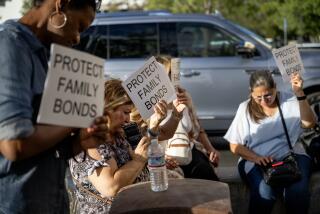Examining the Lessons of Childhood
- Share via
One Easter morning several years ago, Robert Wuthnow stopped to watch the sun rise over a lake in New Jersey. A car pulled into the parking space next to his and out popped two women and two little children. Wuthnow could see that they were “barely surviving financially,” yet they bounced out of the car, the women holding two baskets and the children excitedly anticipating the Easter egg hunt about to begin. The children frolicked, and one of the women took snapshots. Later that morning, sitting in church, Wuthnow was overcome by the beauty of the moment, and he began to wonder how the children might remember the experience. Was there anything conscious about their activities? Did they think they were engaging in a “religious” activity? Or was it simply a family outing triggered by religion but not experienced spiritually?
“ ‘Growing Up Religious,’ ” Wuthnow writes, “is my attempt to find out what is happening. I am interested in the childhood experiences that give us clues about the nature of spirituality.”
*
Trained as a social scientist, Wuthnow, who teaches at Princeton, undertakes a comprehensive study in order to answer his question. It is vast undertaking, stretching over three years, encompassing daylong interviews of 107 women and 93 men evenly distributed by age and religious denomination. Using this data, Wuthnow attempts to address such issues as how people remember their childhood religious experiences and how these influence their attitudes as adults. He is also interested in learning how parents, grandparents and the “faith community” relate to children and how those relations perpetuate faith and tradition. He wants to understand how “ordinary people,” rather than theologians or scholars, “interpret their own experiences of growing up religious” and offers several hundred pages of stories, revolving around themes such as family rituals, holidays, attending services, moving away from home and remembering the past.
Wuthnow hopes these stories will form a textured narrative that illuminates his central conundrums. Yet that is not the effect. Wuthnow is too chary of saying what he thinks. Although he provides a unique window into the religious psyche of ordinary Americans, he leaves us somewhat adrift when it comes to the larger meaning. Are we to generalize from these stories? If so, what do they add up to? And if they form a complex, layered and ambiguous picture not susceptible to easy generalizations, then what does that tell us about American society and the attempt of social scientists to arrive at some coherent description of it?
*
The stories range from mundane to odd to touching. We learn about Hal Myerson, a Jewish man in his 50s who reminisces about the tightknit community of his youth; we visit Jess Hartley, who grew up in North Carolina with working-class parents who regularly attended the United Holy Church; we follow the childhood of Mary Shannon with her Irish sisters and happy holidays. We learn about how they and dozens of others remember the rituals of religion--the meals, the special clothing, the family dynamics--far more than they remember any theological lesson. They experience religion not as an abstract philosophical system but as a web of relationships and pressures and emotions. As adults, they translate their memories, editing here and altering there, and try to integrate those childhood experiences into their adult lives.
Wuthnow is especially intrigued by the process of remembering. Yet he conveys that curiosity without offering any guidance about how he or how we ought to navigate the corridors of the past. Are we to trust childhood memories of religion, or are these memories so filtered and distorted over time that they are more indicative of adult attitudes than actual childhood experience? How much does nostalgia color what these people told their interviewers?
The book concludes with some observations about religion and multiculturalism. Wuthnow rightly notes that multiculturalism is not a creed. People believe that their own faith community has the clearest path to God and redemption. But they resign themselves to the impossibility of forcing others to see the same light, and they prefer not to have others trying to force them. Multiculturalism and diversity are compromises. That is the most profound observation in this otherwise meandering book, and it marks a rare moment when Wuthnow steps out of his role as a neutral academic and allows himself to speak. It’s admirable that he is so diligent and so interested in people who are normally invisible that he can capture their voices; it’s a shame that he is so wary of judging them that he denies us his own.
Zachary Karabell is a frequent contributor to The Times’ Religion page.


